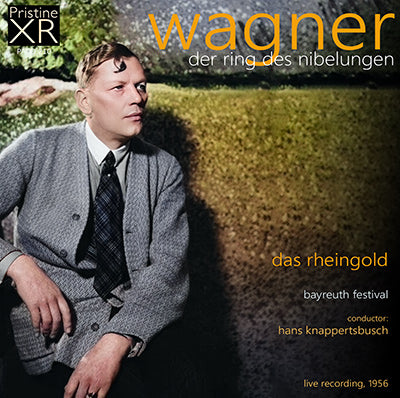
This album is included in the following sets:
This set contains the following albums:
- Producer's Note
- Full Track Listing
- Cover Art
"Chiefly renowned for his Wagner interpretations, Knappertsbusch disliked recording as much as he abhorred rehearsals. He preferred to “wing it” in the theater, allowing the inspiration of the moment to guide the performance at hand, letting the chips fall where they might. Consequently, you never knew what you were going to get for the price of your ticket. For instance, there are wonderful moments aplenty throughout the 1957/58 Rings. But the stodgy, pedestrian, and often sloppy work that generally persists does not hold up under the microphone’s unforgiving scrutiny. Not that Knappertsbusch would have wanted these Rings issued, but that’s neither here nor there.
On the other hand, just about every bar of his 1956 Ring reveals that Kna could deliver first rate, even inspired goods when he put his mind to it. Even considering the tortoise-like pacing and massive textures, Knappertsbusch’s shaping of each opera boasts more pointed detail, greater animation within phrases, and sharper dramatic contours. His singers, in turn, respond with more vivid performances than their norm under this conductor. Perhaps the principals (Varnay, Neidlinger, Windgassen, Hotter, and Greindl) are in fresher vocal estate three years earlier for Clemens Krauss and Joseph Keilberth, yet their moment-to-moment involvement plus unusual care in making the words clear is never in question.
Both Siegfrieds were still relatively new roles for Wolfgang Windgassen, and his interpretation had evolved quite a bit in three years, especially in the opera named for the protagonist. The hero’s Act Two musings take on a new introspection, and there’s more intensity now to his crucial encounter with the Wanderer in Act Three. Die Walküre lets us hear Windgassen’s Bayreuth Siegmund for the first time; the tenor was an eleventh-hour replacement, and an effective one at that. Gré Brouwenstijn partners him as Sieglinde, and the soprano radiates more spontaneity here than in her underrated studio portrayal under Leinsdorf. In Götterdämerung Brouwenstijn’s inward and musicianly Gutrune breathes new life into a role that is often slighted. Hans Hotter brings immense authority to both the Rheingold and Walküre Wotans and the Wanderer in Siegfried, and is in fresher voice than for his contributions to the renowned Solti studio Ring. Astrid Varnay’s powerful Götterdämmerung Brunnhilde, by contrast, is a shade less steady than the 1951 Bayreuth performance under Knappertsbusch issued on Testament."
Jed Distler - Classics Today, review of Music & Arts issue (excerpt), 1998
KNAPPERTSBUSCH The 1956 Wagner Ring: 1. Das Rheingold
disc one (77:55)
SCENE ONE
1. Prelude (3:51)
2. Weia! Waga! Woge, Du Welle! (2:46)
3. Garstig Glatter Glitschriger Glimmer! (5:50)
4. Wallala! Lalaleia! (2:59)
5. Lugt, Schwestern! (6:58)
6. Der Welt Erbe Gewänn' Ich Zu Eigen Durch Dich! (4:27)
SCENE TWO
7. Wotan! Gemahl! Erwache! (10:27)
8. Sanft Schloss Schlaf Dein Aug' (8:13)
9. Ihrer Mitte drum sei sie entführt! (2:30)
10. Endlich Loge! (4:11)
11. Immer Ist Undank Loges Lohn! (7:45)
12. Ein Runenzauber Zwingt Das Gold Zum Reif (3:35)
13. Hör', Wotan, Der Harrenden Wort! (3:08)
14. Was Sinnt Nun Wotan So Wild! (5:09)
15. Auf, Loge, Hinab Mit Mir! (4:42)
SCENE THREE
16. Hehe! Hehe! Hieher (1:25)
disc two (79:37)
1. Dem Haupt fügt sich der Helm (1:31)
2. Nibelheim hier- durch bleiche Nebel was blitzen dort (6:02)
3. Nehmt euch in acht! Alberich naht - Sein harren wir hier (8:47)
4. Vergeh, frevelnder Gauch! - Was sagt der! - Sei doch bei Sinnen! (4:34)
5. Ohe! Hahaha! Ohe! Hahaha! Schreckliche Schlange (6:51)
SCENE FOUR
6. Da, Vetter, sitze du fest! (5:21)
7. Gezahlt hab' ich; nun laßt mich zieh'n! (6:04)
8. Bin ich nun frei! Wirklich Frei! (4:30)
9. Fasolt und Fafner nahen von fern (5:12)
10. Gepflanzt sind die Pfahle (6:25)
11. Weiche, Wotan, weiche! (5:11)
12. Hort, ihr Riesen! Zuruck, und harret! - Halt, du Gieriger! (6:46)
13. Schwules Gedunst - Zur Burg fuhrt die Brucke (3:37)
14. Abendlich strahlt der Sonne Auge (4:37)
15. Rheingold! Rheingold! Reines Gold! Wie lauter und hell (4:09
Chorus and Orchestra of the Bayreuther Festspiele
conducted by Hans Knappertsbusch
CAST
Wotan - Hans Hotter
Donner - Alfons Herwig
Froh - Josef Traxel
Loge - Ludwig Suthaus
Alberich - Gustav Neidlinger
Mime - Paul Kuen
Fasolt - Josef Greindl
Fafner - Arnold van Mill
Fricka - Georgine von Milinkovic
Freia - Gré Brouwenstijn
Erda - Jean Madeira
Woglinde - Lore Wissmann
Wellgunde - Paula Lenchner
Floßhilde - Maria von Ilosvay
Recorded live at Bayreuth,13 August, 1956
Ambent Stereo XR remastering by: Andrew Rose
Cover artwork based on a photograph of Hans Knappertsbusch
Total duration: 2hr 37:32

